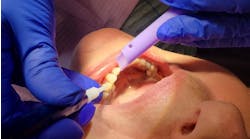OAK BROOK, Illinois--As lawmakers grapple with the challenge of transforming the nation's healthcare system, Delta Dental is urging them to consider oral health in the discussion.
The organization has released a set of principles that articulate its perspective and outline specific policy implications.
"Dental benefits should not be neglected in the debate over fixing the healthcare system," said Kim Volk, president and CEO of Delta Dental Plans Association. "These principles reflect our commitment to making certain that all Americans enjoy the oral health they deserve."
Without offering specific recommendations, the principles inform policymakers and public health officials about dental benefits and the market conditions required to preserve and advance their role in creating access to affordable dental care.
The document first sets forth a series of fundamental observations that frame the issue, which are as follows:
Dental is an inseparable part of health and overall wellness. Dental benefits promote not just dental health but systemic health. According to the Academy of General Dentistry, more than 90 percent of systemic disease including diabetes, cancer and stroke has oral manifestations that are detectable during oral exams.
A growing body of evidence also suggests control of caries and periodontitis can improve health outcomes.
Dental is different; third party dental carriers add value. While dental health is integral to overall health, the dental delivery system remains vastly different than medical. A quality dental carrier can deliver more appropriate dental services, more cost effectively, with more protection for consumers than is generally available to those who finance their own care.
Dental coverage creates affordable access for millions of Americans. Some 164 million Americans currently enjoy the benefits of cost-efficient, consumer-oriented and effectively administered dental benefits with stable and predictable premiums.
Everyone deserves dental coverage. Not everyone has it. Despite the success of dental benefits in promoting oral health and overall health, nearly half of all Americans still lack dental coverage. Soaring medical costs threaten to exacerbate the problem.
The policy implications that follow these observations include:
Policy Implication I: Any legislative and/or regulatory approach that adds to the cost of administering or obtaining dental benefits and/or hinders the development of lower cost alternative plan designs will have the unintended effect of reducing the number of Americans with access to affordable dental coverage.
Policy Implication II: Dental carriers should be encouraged in their efforts to develop and enforce competitive fee arrangements, equitable reimbursement and dental policies, and innovative plan design to ensure necessary and appropriate care.
Policy Implication III: Dental coverage should not be neglected in the debate over how to fix healthcare.
Policy Implication IV: Dental benefits should be included as part of any reform proposal that: strives to increase access to affordable care for those not already covered; expands or builds upon existing programs that successfully provide dental benefits; relies on qualified, experienced dental administration (including stand-alone dental carriers) to deliver appropriate, necessary services; does not undermine healthy competition in the dental benefits marketplace; does not reduce employers' and/or individuals' capacity to continue sponsorship of existing dental benefits; does not jeopardize the tax-advantaged status for those who sponsor and/or pay the cost of their own dental coverage; and preserves at least the current portion of healthcare expenditures committed to dental treatment and coverage.
Policy Implication V: Reform proposals should not: erode existing, comprehensive dental benefit programs currently prevalent in the group benefits marketplace; be administered by a single-payer, government-sponsored agency that eliminates the important role of third party administration; exclude stand-alone dental carriers from competing with full service health for government and/or publicly sponsored contracts; erect higher, more costly barriers to the development and offering of cost-effective program administration; or reduce the current portion of healthcare expenditures committed to dental treatment and coverage.
"Policymakers have a tremendous opportunity to change our healthcare system for the better," said Volk. "These oral health principles can guide them toward good public policy that considers the full equation."





